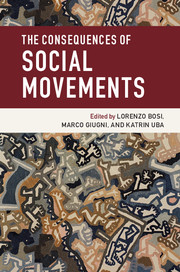Book contents
- Frontmatter
- Contents
- List of figures
- List of tables
- List of contributors
- Introduction
- Part I People
- 2 All is not lost: the 1984–85 British miners’ strike and mobilization after defeat
- 3 Personal effects from far-right activism
- 4 The biographical impact of participation in social movement activities: beyond highly committed New Left activism
- 5 Examining the intergenerational outcomes of social movements: the case of feminist activists and their children
- 6 Aggregate-level biographical outcomes for gay and lesbian movements
- Part II Policies
- Part III Institutions
- Conclusion
- Index
- References
2 - All is not lost: the 1984–85 British miners’ strike and mobilization after defeat
from Part I - People
Published online by Cambridge University Press: 05 January 2016
- Frontmatter
- Contents
- List of figures
- List of tables
- List of contributors
- Introduction
- Part I People
- 2 All is not lost: the 1984–85 British miners’ strike and mobilization after defeat
- 3 Personal effects from far-right activism
- 4 The biographical impact of participation in social movement activities: beyond highly committed New Left activism
- 5 Examining the intergenerational outcomes of social movements: the case of feminist activists and their children
- 6 Aggregate-level biographical outcomes for gay and lesbian movements
- Part II Policies
- Part III Institutions
- Conclusion
- Index
- References
Summary
Outcomes have impacts. Social movement scholars, as this volume attests, have turned their attention to the analysis of social movement outcomes, primarily, and unsurprisingly, in terms of victory and defeat. Outcomes of success or failure have additional consequences. For example, success in a social movement campaign can transform the terrain for future campaigns. A social movement's success can shape, positively or negatively, the political opportunity structure by changing, for example, labor law or electoral law; forcing elected or appointed public officials to resign; setting the issue agenda for a national election or referendum; extending political rights upon which new rights can be built; and provoking opposition and counter-movement mobilization. In addition, success – whether attributable or incidental to the social movement – can encourage further, future activism among its adherents. Success can create and strengthen collective identity, inspire additional campaigns on related issues, increase social movement “standing,” and promote alliances.
Loss in social movement campaigns can also shape opportunities for future attempts. Loss can confirm and reinforce existing hostile political opportunity structures, strengthen opponents, exclude the movement's issues and demands from the political agenda, and constrict political rights. Loss can demobilize activists, dispel potential supporters, and undermine collective identity and group solidarity. Depending on the nature of the loss, defeat in a social movement campaign can result in the eradication of a movement cohort, through persecution, imprisonment, and/or murder of leaders, activists, and sympathizers.
Ironically, as Gupta (2009, 420) suggests, success in a social movement campaign can also have negative consequences, depressing involvement as activists experience “a sense of satiety” and “find themselves less willing to continue devoting scarce resources and time to the movement.” Conversely, social movement loss may have mobilizing impacts. “Under a satiety scenario,” as Gupta argues (2009: 420), potential activists may “mobilize in order to prevent a total policy rout.”
This chapter examines a case of social movement defeat and asks about a potential positive impact of loss: do social movement activists remobilize after loss and, if so, how? Employing a single, cross-time case-study design, the chapter examines the experience of the coalfield communities associated with Parkside Colliery across two anti-pit closure campaigns in Britain, focusing on women's activism in the anti-pit closure campaigns.
- Type
- Chapter
- Information
- The Consequences of Social Movements , pp. 41 - 65Publisher: Cambridge University PressPrint publication year: 2016
References
- 5
- Cited by



